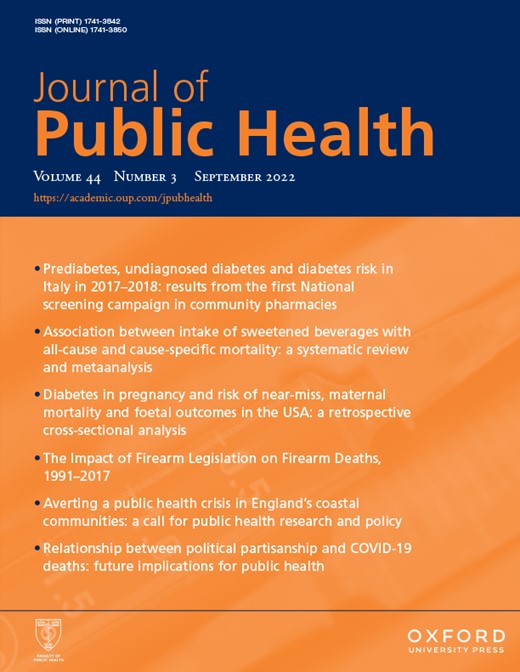-
PDF
- Split View
-
Views
-
Cite
Cite
Melona C Deguma, Charisma G Lumayag, Mary Anne C Villaganas, Niña Rozanne T Delos Reyes, Jabin J Deguma, From anxious loneliness to meditation: a mental health self-care strategy to cope with the COVID-19 pandemic, Journal of Public Health, Volume 44, Issue 3, September 2022, Pages e402–e403, https://doi.org/10.1093/pubmed/fdab257
Close - Share Icon Share
Abstract
It has been a matter of public knowledge that physical and mental health are intertwining concerns. With a high association between the individuals’ experience of the novel Corona Virus Disease in 2019 (COVID-19) and their psychological distress, mental health experts recognized mental health as a coterminous public health concern with the COVID-19 pandemic. In this journal, a systematic review study pointed out that mental health is the most affected issue concerning implementing governments worldwide adopted policies like staying at home, social distancing and ‘lockdown’ measures. However, we argue that these containment measures could be non-detrimental to mental health when one transforms his or her experience of anxious loneliness into an avenue of practicing meditation as a strategy of mental health self-care.
It has been a matter of public knowledge that physical and mental health are intertwining concerns. Weak physical health increased the risk of developing mental health problems and vice versa. Mental health is unarguably one of the most compromised aspects of the human condition inadvertently affected by the COVID-19 pandemic. As purported by scientific publications, there was a high association between the individuals’ COVID-19 experience and the onset of their psychological distress1–3; thus, mental health experts recognized mental health as a coterminous public health concern with the COVID-19 pandemic. Furthermore, the strict health protocols (e.g. social/physical distancing and mandatory quarantine/isolation) that curb the rising cases of viral infection have also adversely inflated the mental health issues.4 While the safest way to control the virus is to further the containment measures, howbeit, doing so affects an individual’s mental health state. A systematic review study published in this journal revealed that mental health is the most affected issue concerning implementing governments worldwide adopted policies like staying at home, social distancing and ‘lockdown’ measures.5
In this paper, we argue that the strict health protocols, particularly the containment measures, could be non-detrimental to mental health when one transforms his or her experience of anxious loneliness into an avenue of practicing meditation as a strategy of mental health self-care. Following the underlying principle of cognitive behavior therapy, people are disturbed not by things, but by their view of things.6 The different circumstances in our lives remained neutral unless we attached meaning to which. While a person cannot control every aspect of the world around him or her, one can manage one’s interpretation and reaction to things in the environment.7 One must note that ‘being alone’ is different from ‘feeling alone’. The former is a ‘rational preference’8 of recognizing the event of being spatially separated from the other/s. By contrast, the latter is a subjective emotional response to the experience of isolation based on ‘an irrational belief’.8 The anxious feeling of loneliness that a person irrationally linked to the event of being physically distant or isolated disturbed his or her mental composure. Physical distancing and self-isolation as containment measures, per se, do not curtail individuality, freedom, self-interest and self-control. On the one hand, based on fact, these restrictive measures effectively contain the viral infection from spreading. On the other hand, a person could transcendentally utilize these measures to help further the necessary relationship one must build with the self—an apt moment to slow down and reflect amid the tumultuous and fast-paced modern society via meditation.
Although mental health care providers initiate innovative strategies like telecounseling,9 technological limitations hampered their accessibility. More often, individuals are left on their own to manage themselves. Mental health experts recommend meditation as a mindfulness practice that promotes mental health self-care.10 The World Health Organization11 defines self-care as ‘the ability of individuals, families, and communities to promote health, prevent disease, maintain health, and to cope with illness and disability with or without the support of a health-care provider’. In an experimental study that observed alleviation of stress during social isolation, guided relaxation and meditation practice may represent helpful exercises to cope with anxiety and stressful sensations.12 As Max Ehrmann wrote in the Desiderata, ‘go placidly amid the noise and the haste, and remember what peace there may be in silence . . . do not distress yourself with dark imaginings. . . . many fears are born of fatigue and loneliness’. In the end, redirecting our attention toward the positive effect of being alone via practicing meditation as a strategy of mental health self-care is far healthier than indulging ourselves in the self-defeating feeling of loneliness.
Authors’ contributions
All authors contributed to all aspects of the manuscript.
Declarations of competing interest
The authors declare that they have no known competing financial interests or personal relationships that could appear to influence the work reported in this paper.



